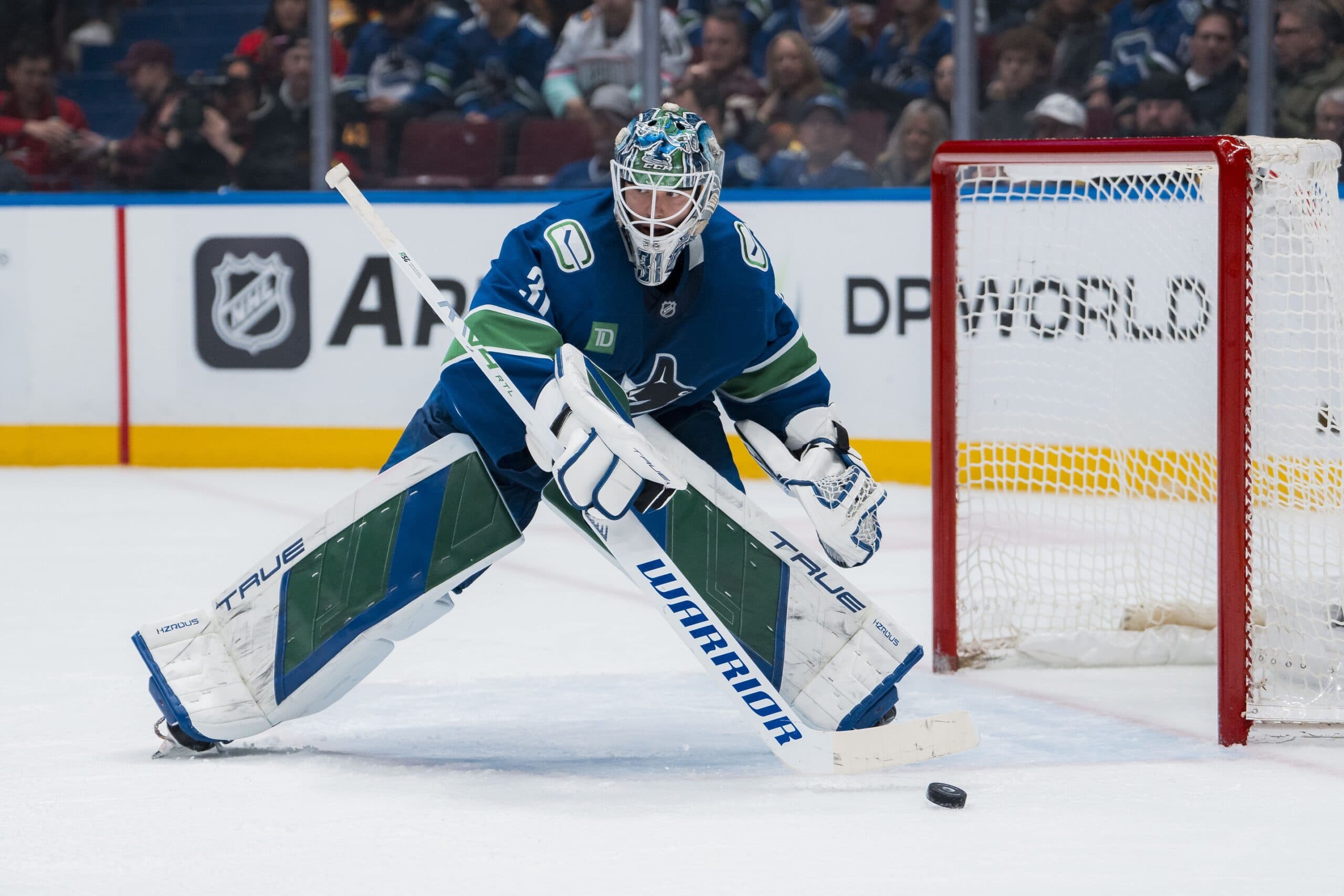Nation Sites
The Nation Network
CanucksArmy has no direct affiliation to the Vancouver Canucks, Canucks Sports & Entertainment, NHL, or NHLPA
At the end of the day, the Canucks kind of had to trade Arturs Silovs: Canucks Conversation

Photo credit: © Bob Frid-Imagn Images
Jul 15, 2025, 12:00 EDTUpdated: Jul 15, 2025, 01:05 EDT
On today’s episode of Canucks Conversation, David Quadrelli and Harman Dayal broke down the Arturs Silovs trade and why, despite his standout AHL playoff performance, the Vancouver Canucks were all but forced to move on.
The Canucks dealt the 24-year-old Latvian netminder to the Pittsburgh Penguins in exchange for a 2027 fourth-round pick and winger Chase Stillman, the 29th overall pick from the 2022 NHL Draft. The move came after Silovs won the Jack A. Butterfield Trophy as Calder Cup Playoffs MVP, helping Abbotsford to its first-ever AHL championship, leaving some fans wondering, why?
“I was trying to bang the drum as loudly as possible during the discussion leading up to Silovs possibly getting traded that goalies, at the best of times, aren’t worth a lot,” Harm said. “Silovs has a lot of potential but he’s unproven at the NHL level, and especially in the circumstance the Canucks were in – opposing teams knew the Canucks would have to deal him, otherwise they’d be at risk of losing him for nothing in the fall. So I expected the return to be around this range.”
For fans surprised that the MVP of the AHL playoffs fetched only a mid-round pick and a prospect, Harm said it’s all about context.
“If you’re just tuning in and had forgotten what happened earlier this season, looking at how he was AHL playoff MVP, .931 save percentage, you’d think it was an underwhelming return,” he said. “But to me it’s perfectly fair and at market value. Overall, it reminds me of the Vasiliy Podkolzin trade where the organization didn’t see a path for the player making the NHL roster and didn’t want to risk losing him for nothing on waivers.”
Quads agreed the trade was unavoidable, but noted the Canucks boxed themselves into this decision.
“At the end of the day, the Canucks needed to trade Silovs,” he said. “There is a bigger conversation to be had about why they had to trade him, because the Canucks did force themselves to make this trade essentially. They chose to extend Thatcher Demko and Kevin Lankinen, and if one of those doesn’t happen, Silovs is likely still a Canuck. Would you rather have taken a not-so-great return for Demko on the trade market and rode with Lankinen and Silovs? Yes, they had to make the trade because of the decisions they made.”
“I also was not up in arms when they extended Kevin Lankinen and was one of the people wanting them to give Demko an extension,” Quads added. “We knew this would be the aftermath of it all.”
Harm emphasized that for all of Silovs’ highs, the Canucks simply couldn’t count on him as a reliable NHL backup at this stage.
“I don’t think you could ever be confident trading away one of Lankinen or Demko just because Silovs had a terrific AHL playoff run,” he said. “We’ve seen him go off on these dominant heaters in May in previous seasons and have it not translate the following year. He was the tournament MVP in 2023 at the Men’s World Championships, and then in the 23–24 regular season in the AHL, he was solid but unspectacular.
“Then in the ‘24 Stanley Cup playoffs, he comes in and out of nowhere emerges as a saviour for them in the absence of Demko and DeSmith. Expectations were really high for Silovs heading into last season; everyone had him tabbed as the opening night starter and then he was practically unplayable at the NHL level.”
Even if Silovs had stayed, Harm pointed out the risk in relying on him as the team’s backup.
“Assuming Thatcher Demko is healthy, we know you have to manage his workload and can’t give him more than 50 starts,” he said. “So whoever was going to be the backup, you need to be confident in that goaltender playing 30–40 games. You feel confident with Lankinen in that role. With Silovs, what if he comes back and still couldn’t fix his inability to stop point shots through traffic? Teams know that’s the weakness in his game.”
“It’s all about risk and percentages,” Harm concluded. “There’s a world where Silovs breaks out next season and has success in Pittsburgh, but sitting here right now, I think the Canucks made the right decision.”
Sponsored by bet365
Breaking News
- Canucks’ Tom Willander showcasing growth both on and off the ice in strong rookie campaign
- Canucks prospect Parker Alcos commits to Quinnipiac of the NCAA for 2026-27
- Is trading Drew O’Connor the Canucks’ easiest route to another decent draft pick?
- CA’s top 15 Canucks mid-season prospect rankings: #8 Anthony Romani
- Olympic Hockey Preview: Canucks’ Pettersson, Hronek, Kämpf and Lankinen all in action; Canada battles Switzerland
